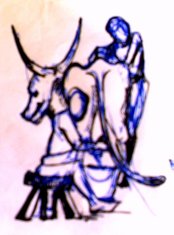September 2009
 Mukami tiwe muruti nguha. (Gikuyu)
Mukami tiwe muruti nguha. (Gikuyu)
Aanayekama no tofauti sana na anayetoa (ng’ombe) kupe/mbung’o. (Swahili)
The one who milks the cow is not the same person as the one who removes (plucks out) ticks from a cow. (English)
Background, Explanation, Meaning and Everyday Use
The meaning is that each of us has been entrusted with one role or many roles in a given task and more so in our society. We should work together for the success of the whole.
Biblical Parallels
This Gikuyu proverb is close to the famous text of St. Paul’s First Letter to the Corinthians 12:12-21 and 27-30:
 For just as the body is one and has many members, and all the members of the body, though many, are one body, so it is with Christ. For in the one Spirit we were all baptized into one body—Jews or Greeks, slaves or free—and we were all made to drink of one Spirit. Indeed, the body does not consist of one member but of many. If the foot would say, “Because I am not a hand, I do not belong to the body,” that would not make it any less a part of the body. And if the ear would say, “Because I am not an eye, I do not belong to the body,” that would not make it any less a part of the body. If the whole body were an eye, where would the hearing be? If the whole body were hearing, where would the sense of smell be? But as it is, God arranged the members in the body, each one of them, as he chose. If all were a single member, where would the body be? As it is, there are many members, yet one body. The eye cannot say to the hand, “I have no need of you,” nor again the head to the feet, “I have no need of you… Now you are the body of Christ and individually members of it. And God has appointed in the church first apostles, second prophets, third teachers; then deeds of power, then gifts of healing, forms of assistance, forms of leadership, various kinds of tongues. Are all apostles? Are all prophets? Are all teachers? Do all work miracles? Do all possess gifts of healing? Do all speak in tongues? Do all interpret?
For just as the body is one and has many members, and all the members of the body, though many, are one body, so it is with Christ. For in the one Spirit we were all baptized into one body—Jews or Greeks, slaves or free—and we were all made to drink of one Spirit. Indeed, the body does not consist of one member but of many. If the foot would say, “Because I am not a hand, I do not belong to the body,” that would not make it any less a part of the body. And if the ear would say, “Because I am not an eye, I do not belong to the body,” that would not make it any less a part of the body. If the whole body were an eye, where would the hearing be? If the whole body were hearing, where would the sense of smell be? But as it is, God arranged the members in the body, each one of them, as he chose. If all were a single member, where would the body be? As it is, there are many members, yet one body. The eye cannot say to the hand, “I have no need of you,” nor again the head to the feet, “I have no need of you… Now you are the body of Christ and individually members of it. And God has appointed in the church first apostles, second prophets, third teachers; then deeds of power, then gifts of healing, forms of assistance, forms of leadership, various kinds of tongues. Are all apostles? Are all prophets? Are all teachers? Do all work miracles? Do all possess gifts of healing? Do all speak in tongues? Do all interpret?
Contemporary Use and Religious Application
In tasks pertaining to reconciliation and peace building in Africa each of us is expected to play one part or the other depending on one’s gifts. But no one should dominate the scene.
NOTE: In his book Under One Roof: Gikuyu Proverbs Consolidated (Nairobi, Kenya; Paulines Publications Africa) Gerald Wanjohi collected 1821 Gikuyu Proverbs. He states: “There are still many original proverbs that have not been reported” (page 8). Mukami tiwe muruti nguha is one of these new, unreported Gikuyu proverbs.
Mr. Francis Osman Njuguna
Nairobi, Kenya
Cellphone: 0720-434819
Email: osnjuguna@yahoo.com
Illustrations by:
Professor Cephas Yao Agbemenu
Department of Fine Arts
Kenyatta University
P.O. Box 43844
Nairobi, Kenya
Cellphone: 0723-307992
Email: cyagbemenu@yahoo.com

